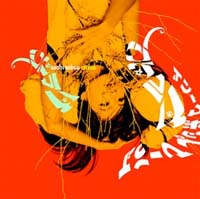|
She
said songwriter James Hanna grew up with a knack for making noise
with his guitar. "All of his bands in high school were him going
crazy on guitar. It made sense that we would continue doing that,
but in a pop structure," Yuki said. "We all love shoegaze,
which is a weird word. Slowdive, My Bloody Valentine, Jesus and Mary
Chain, and even new stuff like Mogwai, it makes sense that it would
creep into what we do."
Still, the shoegaze
tag is getting rather old. "I'm tired of the comparison,"
Yuki said. "It's asked about in every interview. I understand
that everyone needs a reference point, that's fine with me. We all
do. But I wish that someone would surprise me with something I never
heard before."
With that gauntlet
laid before me, I'm going to suggest that Asobi Seksu has a sound
reminiscent of 18th Dye, a short-lived (though recently reformed)
German/Danish noise band that recorded on Matador in the '90s. OK,
that's a bit of a stretch. To be honest, beyond their own unique
style, the only other core influence that comes to mind is a more
well-known band called The Cure, whose early material bears the
same bouncing bass lines and delectable pop sense.
If the shoegaze
influence is the No. 1 question Yuki gets from clueless music journalists,
No. 2 probably centers around the whole language thing. About half
of Asobi Seksu's songs are sung in Yuki's native language, Japanese.
Yuki was born in Okinawa, where she lived until the age of two.
"My first
language was Japanese," she said. "When we moved to Los
Angeles my mother thought I picked up English right away. She said,
'Oh my gosh, my daughter is only two and she's speaking English.
She's so smart!' When she asked me to show her friends, they just
laughed and said, 'That's not English. That's Japanese spoken with
an American accent.' Her friends thought it was hysterical."
Using Yuki's
first language in their music was an idea embraced by Hanna, who
insisted that "I'm Happy But You Don't Like Me" -- a tune
he wrote for the band's debut album -- be sung in Japanese. "He
called me and sang it in falsetto using made-up Japanese sounds,"
she said, laughing. "He said, 'This is going to be your next
Japanese song.'
"We use
language as another instrument, as part of our overall sound,"
Yuki added. "I don't feel it's important that people grasp
the words, but at the same time I wouldn't say the words aren't
important. We get a lot of requests for lyrics."
The exotic language
also has helped attract fans to the band. "A lot of people
found us because of our use of Japanese and because of our Asian
background," she said. "They stick around because they
like the music."
Back to 
Published in The Omaha Reader Jan. 17, 2007.
Copyright © 2007 Tim McMahan. All rights reserved.
|

|
"I
don't feel it's important that people grasp the words, but
at the same time I wouldn't say the words aren't important."
| |
|
